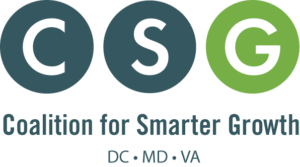Press Release
FOR IMMEDIATE RELEASE
July 10, 2019
CONTACT
Cheryl Cort, Coalition for Smarter Growth
202-675-0016
cheryl@smartergrowth.net
DC Bus Service gets a “D” on its Report Card
Groups highlight how DC buses can be faster and more reliable
D.C. – Today, Coalition for Smarter Growth and MetroHero released a first-ever performance-based DC Bus Report Card. Developed from real-time data collected in May 2019 by MetroHero, the report shows DC’s major bus routes suffer from poor reliability and sluggish speeds, factors that are likely major contributors to the system’s declining ridership. The analysis of the report card can be found here.
“Our analysis shows the challenges Metrobus riders encounter on a daily basis. On the city’s priority corridors with high-ridership routes, we found service to be generally unreliable and unpredictable, with speeds slower than 10 mph,” said Jennifer Hill, Ph.D., Lead Researcher at MetroHero.
“The slow speeds and lack of on-time reliability are contributing factors in declining ridership. But we know how to turn this around: give buses priority on the streets, speed up boarding, balance bus stop spacing, and provide customer-focused service,” said Cheryl Cort, Policy Director for the Coalition for Smarter Growth.
MetroHero analyzed bus performance for 34 routes in DC’s highest ridership corridors in May 2019, focusing on three key factors: adherence to designated headways, adherence to scheduled arrival times, and average travel speed. Bus speeds on these routes averaged just 9.5 mph over the entire month, confirming other data showing that Metrobus speeds across the entire system have been getting slower every year.
“We hope that this report will be a useful tool to inform decision-makers about where DC’s buses need the most help and what solutions will have the greatest impact for riders,” said Hill.
DC and Metro are stepping up to implement improvements to bus service. DC recently implemented pilot bus lanes on H and I Streets downtown, and is planning to run bus lanes on 16th Street and K Street in the near future. The city has also implemented traffic signal priority and queue jumps on several corridors.
On an average weekday, Metrobuses transport over 200,000 riders around the District of Columbia to and from work, school, doctor appointments, grocery stores, entertainment, and more. Buses offer transit service far beyond the reach of Metrorail.
“This is an important moment for DC’s bus service. Buses are the most efficient use of limited public street space for moving people, and critical if the city is to grow without choking on traffic. We are encouraged by recent city actions, but urge the Bowser administration to make moving buses truly a top priority on our city’s streets,” said Cort.
About the Coalition for Smarter Growth
The Coalition for Smarter Growth is the leading organization in the Washington DC region dedicated to making the case for smart growth. Our mission is to promote walkable, inclusive, and transit-oriented communities, and the land use and transportation policies and investments needed to make those communities flourish. Learn more at smartergrowth.net.
About MetroHero
MetroHero (www.dcmetrohero.com), which began as a simple app designed to visualize real-time train positions in the D.C. Metrorail system, has been monitoring and providing performance metrics on WMATA’s trains for over three years. The app has gained popularity with many area commuters, averaging roughly 15,000 unique users every month, largely due to its unique real-time visualizations of the current state of the Metrorail system, from train delays and service outages to user-driven reports of inconveniences such as station crowding and broken intercoms. In September 2018, the MetroHero team extended a number of their train performance tracking algorithms to the Metrobus system, which they used to gather performance data for the report card.
###


